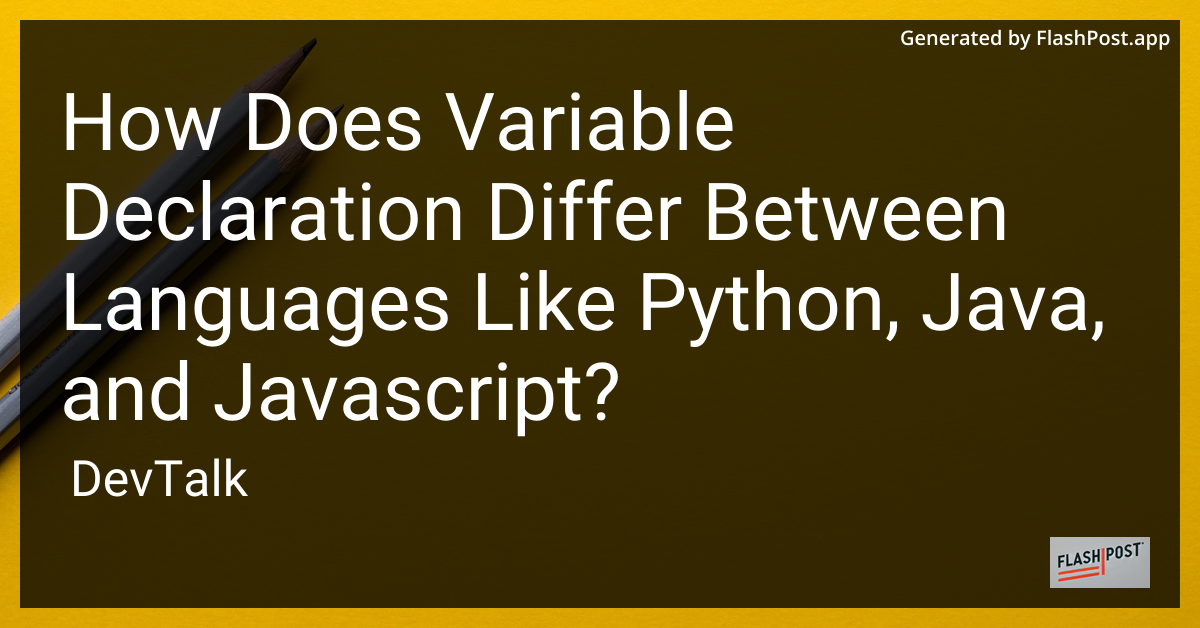How Does Variable Declaration Differ Between Languages Like Python, Java, and Javascript?
 # How Does Variable Declaration Differ Between Languages Like Python, Java, and JavaScript?
# How Does Variable Declaration Differ Between Languages Like Python, Java, and JavaScript?
Understanding variable declaration is crucial for efficient programming and maintaining code clarity.
Variable declaration can significantly differ across programming languages, influencing code readability and performance. In this article, we'll delve into how variable declaration varies in Python, Java, and JavaScript, highlighting the unique characteristics and commonalities among these popular languages.
Variable Declaration in Python
Python is renowned for its simplicity and readability, and this is reflected in its variable declaration approach. In Python, variables are dynamically typed, meaning you don’t need to explicitly declare the data type. A variable is created as soon as a value is assigned to it. Here’s a fundamental example:
# Variable declaration in Python
my_number = 10
my_string = "Hello, Python!"
Python variables are dynamically typed and can change type as needed. This flexibility fosters rapid development and ease of use.
Variable Declaration in Java
Java, a statically typed language, requires explicit declaration of variable types. This means that when you declare a variable in Java, you need to specify its data type. Java’s strict type system helps catch errors at compile-time and enhances performance. Here’s how you can declare variables in Java:
// Variable declaration in Java
int myNumber = 10;
String myString = "Hello, Java!";
Java’s type system requires that variable types match their initial assignment, ensuring robust and error-free code.
Variable Declaration in JavaScript
JavaScript is a versatile language used widely for web development. It's dynamically typed, similar to Python, allowing for flexible variable declarations. In recent versions, JavaScript introduced let, const, and var to declare variables. Here’s an example of variable declaration in JavaScript:
// Using let and const for variable declaration in JavaScript
let myNumber = 10;
const myString = "Hello, JavaScript!";
letis used for block-scoped variables and can be updated, but not re-declared.constis also block-scoped but cannot be updated or re-declared.var, an older syntax, is function-scoped and can be re-declared and updated.
JavaScript’s flexibility is beneficial in dynamic web applications but requires attention to prevent unexpected behavior due to its scoping rules.
Explore More on Variable Declarations
For those interested in learning about variable declarations in other programming ecosystems, here are some valuable resources:
- Variable Declaration in CodeIgniter
- Kotlin Variable Declaration
- PHP Variable Declaration
- Variable Declaration in Prolog
- Programming Variable Declaration Tutorial
Understanding these differences is key to selecting the right language for your project requirements and leveraging each language's strengths.
Conclusion
Different programming languages offer varied methods for variable declaration, each tailored to their strengths and design philosophies. Python’s dynamic typing simplifies code, Java’s static typing ensures stability and performance, while JavaScript offers unmatched flexibility for web development. By appreciating these differences, developers can write better, more efficient code and make informed decisions in language selection for various projects.